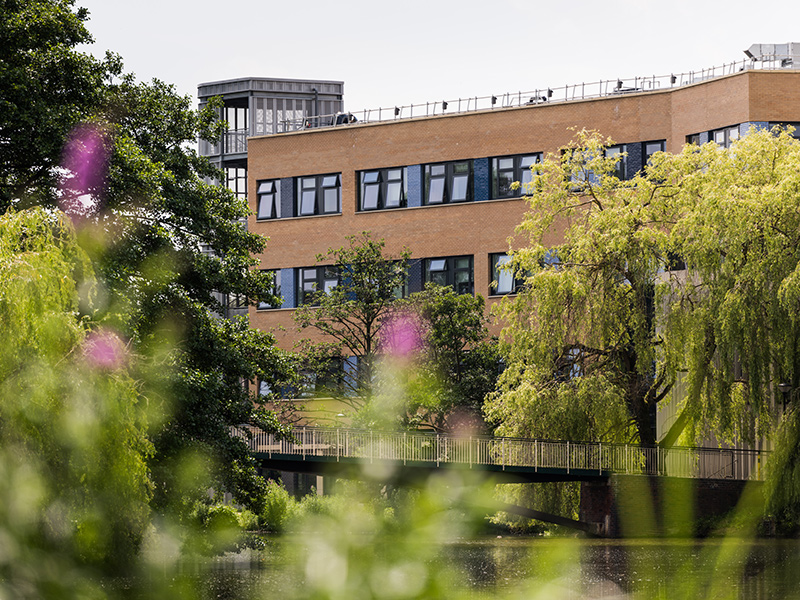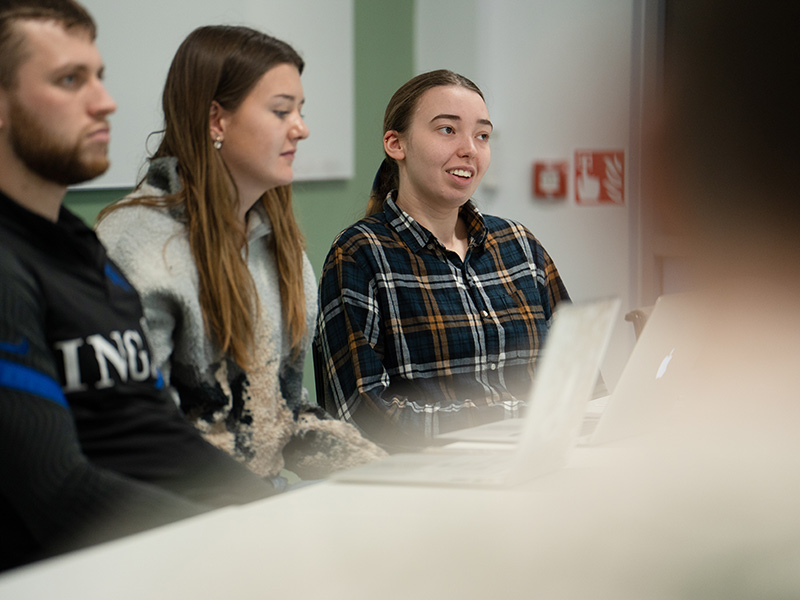
Studying beyond your department
York Interdisciplinary Modules (YIMs) exploring sustainability
Work collaboratively in multi-disciplinary teams to solve local, regional and global sustainability challenges. There are four undergraduate modules and one postgraduate module for you to explore. You'll be taught by academics from different departments and work in groups with students from across the University, allowing you to apply your expertise to these challenges and learn from students and staff from other disciplines.

Language electives
Language electives help you broaden your horizons and deepen your knowledge of different cultures. In a globalised and interconnected world, it can give you a competitive edge. You can choose from a wide range of language modules available at different levels of study in languages including Arabic, Chinese, Classical Latin, French, German, Italian, Japanese, Korean, Medieval Latin and Spanish.

York general electives
Each year, departments and schools open up some of their modules for students outside their degree programme to take. To help you find what might be of interest, we’ve grouped these modules under themes:
Explore elective modules
You can search the module catalogue for all elective modules. You just need to:
- Select the academic year in which you want to take the module
- Select ‘show advanced filters’
- Tick the ‘elective module’ box
You can then filter further by department, teaching period, credit level and theme.
Please ensure you select modules with a credit level appropriate for your stage of study. For example, if you will be a Year 2 undergraduate when you take the module, you can only select Level I modules:
Certificate (C) = Year 1 undergraduate
Intermediate (I) = Year 2 undergraduate
Honours (H) = Year 3 undergraduate
Masters (M) = Masters level and Year 4 undergraduate
How to apply
Found a module you would like to pursue? There are a few things you'll need to do:
- Check whether your programme of study allows you to take an elective module when you want to study it (if your department or school hasn't already let you know then see 'Who can I contact' in our FAQs below)
- See whether you need to check your timetable before applying to avoid module clashes (see below)
- If applying over the summer for semester 1, make sure you're enrolled for the new academic year beforehand
- Check application deadlines
Done all that? Then apply for your elective module via e:vision. Go to ‘Your study’ and navigate to the ‘Module registrations’ section, then select ‘Elective Module Application’.
Information you will need to apply
You’ll need the following information from the module catalogue before you start the application:
- Module name
- Module code
- Details about prerequisite qualifications or skills (if applicable)
- Documentation to evidence the prerequisite qualifications or skills (if applicable)
If applying for a York general elective, you will also need:
- Department offering the module
Application deadlines
There are separate deadlines depending on the type of elective module you are applying for and when this module is being delivered.
Undergraduates
For York general elective modules, undergraduates need to wait until your timetable has been released so you can check that the elective module can be timetabled alongside your programme. You should not apply for any York general elective module before checking your timetable.
| Elective module type | Need to check your timetable before applying? | Application deadline to take modules in 2026/27 |
|---|---|---|
| York Interdisciplinary Module | No | Saturday 7 March 2026 |
| Language elective | No | Saturday 7 March 2026 |
| York general elective |
Yes - Semester 1 timetable is released on 5 August 2026 Yes - Semester 2 timetable is released in December |
Semester 1 modules - Friday 21 August 2026 Semester 2 modules - Friday 22 January 2027 |
Postgraduates
| Type of elective module | Application deadline to take modules in 2026/27 | Missed the deadline? |
|---|---|---|
| York Interdisciplinary Module (Sustainability Clinic) | Friday 25 September 2026 | Email esay@york.ac.uk - though we cannot guarantee a space on the module for late applications. |
| Language elective | Welcome Week (Week 0) | It may be possible to apply up to Teaching Week 2, but the earlier you apply, the fewer classes you will miss. |
| York general elective |
|
It may be possible to apply up to Teaching Week 2 - check with your home department and the department offering the module. |
How to check your timetable for clashes
See our video on how to check your timetable for module clashes or read our guidance on how to add or remove a module timetable from your timetable view.
Missed the deadline?
You can still apply for a York Interdisciplinary Module and a language elective after the deadline but, due to timetabling constraints, you may not be able to take your chosen elective module. When your timetable is released, follow the process for York general electives and check that the elective module fits into your timetable. If there are no clashes, follow the application process via e:Vision.
If you have missed the deadline for the York general electives, you should contact the module owning department and your home department to check they are able to take applications after the deadline. If they can, follow the usual application process via e:Vision.
FAQs
What happens after I apply for an elective module?
When you apply, your department and the department who runs the module you’ve selected will automatically be notified.
You are automatically approved to study York Interdisciplinary Modules (YIMs). However, places on the other categories of elective modules are subject to approval from both departments, space being available and timetabling.
When will I know whether I have a place on my chosen elective?
Undergraduates
For YIMs and language electives, the approval should appear on the application form on e:vision before the start of the summer break. Your elective module will appear on your timetable when it is released, if your application has been approved.
For York general electives and for late applications for YIMs and language electives, the approval from both the module owning department and your home department should appear on the application form on e:vision within three weeks after the deadline for applications. Your timetable will be updated shortly after if your application is approved by both departments and there are no clashes on your timetable.
Postgraduates
The approval should appear on the application form on e:vision within a few weeks of submitting your application form.
You are pre-approved for the YIM (Sustainability Clinic) as long as you apply before the deadline. Your home department is the only department who needs to approve your application.
For all other modules, both the offering department and your home department need to approve your application. Your student record and timetable will be updated shortly after approval.
Who can I contact if I have questions about elective modules?
| Elective modules by department | Departmental contact | |
|---|---|---|
| Archaeology | Programmes Administrator (UG) | archaeology-ug@york.ac.uk |
| Programmes Administrator (PG) | archaeology-pg@york.ac.uk | |
| School of Arts and Creative Technologies |
Student Support Administrator (UG) | act-ug-admin@york.ac.uk |
| Student Support Administrator (PG) | act-pg-admin@york.ac.uk | |
| Biology | Student Support Administrator | biol-student-services@york.ac.uk |
| Centre for Medieval Studies |
Student Support Administrator
|
cms-office@york.ac.uk |
| Centre for Women's Studies | Student Support Administrator | cws@york.ac.uk |
| Chemistry | Student Support Administrator | chem-ug-office@york.ac.uk |
| Computer Science | Undergraduate Administrator | cs-ug-admin@york.ac.uk |
| Economics and Related Studies | Student Services Team | econ-ug-enquiries@york.ac.uk |
| Education | Student Support Administrator | education-undergraduate-administrator@york.ac.uk |
| English and Related Literature Undergraduate modules |
Student Support Administrator | english-enquiries@york.ac.uk |
| Environment and Geography | Student Support team | environment-ugstudents@york.ac.uk |
| Health Sciences Postgraduate modules |
Student Support Administrator | dohs-pgt-support@york.ac.uk |
| History |
Student Services Team Support Administrator |
history-ug-enquiries@york.ac.uk |
| History of Art | Student Support Administrator | history-of-art@york.ac.uk |
| Language and Linguistic Science | Student Support Administrator |
For language electives: languages@york.ac.uk For York general electives: lls-ug-enquiries@york.ac.uk |
| York Law School | Undergraduate Programme Admin Team | law-ug-admin@york.ac.uk |
| Mathematics | Student Support Administrator | maths-enquiries@york.ac.uk |
| Philosophy | Student Support Administrator | philosophy@york.ac.uk |
| Psychology |
Student Support Administrator
|
|
| School of Physics, Engineering and Technology | Student Support Administrator | phys-ugadmin@york.ac.uk |
| School for Business and Society | Student Support Administrator | sbs-engagement@york.ac.uk |
| Sociology |
Student Support Administrator |
sociology-assessments@york.ac.uk |
| York Interdisciplinary Modules (YIMs) |
Student Support Administrator
|
esay@york.ac.uk |
A different approach to studying
When applying or preparing for an elective module, you'll need to consider what different approaches you will need for your study skills. Your elective department might have different policies, processes and expectations. See our tips to help you to make the most out of your time in another department.

Or integrate work experience into your studies?
Students from almost all undergraduate courses can complete a Placement Year in your penultimate year of study, extending your time at York by one year and adding 'with placement year' to your degree title.
Placements give you the opportunity to experience the world of work, find out if a particular job or sector is right for you, and enhance your graduate employment prospects. Support is available from Careers and Placements to help you understand if a placement is for you, and to assist in securing an opportunity.

